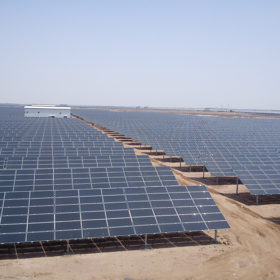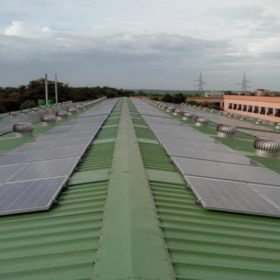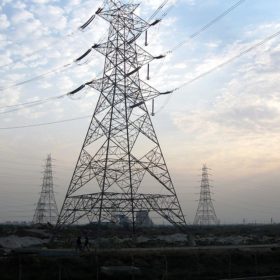AES, Mitsubishi tie up on India’s first grid-scale storage array
The U.S. power group and the Japanese industrial giant will jointly supply a 10 MW Advancion energy storage bank to help integrate renewables such as solar into a grid network operated by Tata Power Delhi Distribution (Tata Power-DDL) in New Delhi.
Indian firms request more time to install rooftop plants
With India’s rooftop market set to boom in 2017, the Faridabad Industries Association (FIA), which represents businesses in the Faridabad region of India, has requested an extension to the December 31st 2016 deadline to install rooftop solar on commercial and industrial units.
India to spend $1.8bn on power lines to support growing solar base
As part of the green corridor project, the Power Grid Corp. of India will build power lines to transmit 20 GW of power capacity across 34 individual solar power plants. Project cost to run to $1.8 billion.
Azure Power completes first phase of 14 MW Delhi Metro solar installation
The Indian renewables developer has finished phase one of the rooftop project at the Delhi Metro Rail Corporation’s Sultanpur facility at a tariff of $0.083/kWh.
Interview: Younicos discusses latest 49 MW UK storage deal
Following this week’s announcement that Younicos will supply a 49 MW storage system in the U.K., pv magazine caught up with the company’s president and CEO Stephen L. Prince to find out more about the project, and Younicos’ wider objectives.
UK awards £40 million in funding to boost EVs
The U.K. government has awarded £40 million to four British cities to support the spread of electrical and low-emission vehicles. Supported projects include car-charging street lighting and zones offering free parking and traffic priority to plug-in and low-emission cars. The initiative is seen as another step towards the smart energy revolution.
Cornwall experiments with ‘sunshine tariff’ as possible alternative for UK solar
A grassroots project in Cornwall, England, is examining ways to implement a special, so-called “sunshine tariff.” The project, although small in scale, could provide the template for the solar business models of the new era of zero subsidies.
UK: The smart home in focus as startups drive innovation
The concept of the smart home is emerging as a hot topic in the debate regarding the U.K.’s energy future. At the EcoBuild last week, a special session entitled “Smart and Efficient Use of Future Energy” depicted accurately the central role solar PV plays in the transition to the smart era. It also highlighted how innovation leadership is coming from small, bottom-up firms as utilities and policy-makers struggle to adapt and embrace the new technologies.








